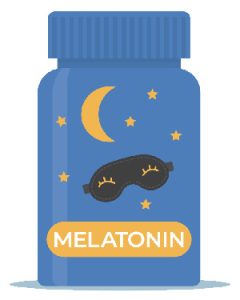A Guide to Taking Melatonin Supplements for Better Sleep

You are not sleeping well, and you want to do something about it. Melatonin supplements are everywhere, and many people begin their “better sleep” journey by taking melatonin supplements.
Experts in sleep medicine agree that melatonin is safe to take; experts also agree that there is an optimal time and dosage required to achieve the most direct effect from any melatonin supplement. While there is a general medical consensus on how to start taking melatonin, this advice is generic and doesn’t consider your individual biology (such as weight, age, sex, or sensitivity to melatonin itself), or your specific goals. The reality is that the ideal timing and dosage of melatonin varies widely among individuals. In fact, taking a melatonin supplement might not even help you at all. So, while safe to take, not knowing your natural melatonin profile before you start may cause your “better sleep” journey to be a waste of time.
It is worth noting that poor sleep caused by sleep disruptions can stem from many different physiological factors, and melatonin supplementation may not be the answer. Consulting with a healthcare professional before starting any supplement regimen is good advice, especially for those with existing medical conditions or individuals using other medications. If you decide to first go forward on your own, we offer the following guidelines to maximize the potential “better sleep” benefit from taking melatonin supplements:
 What do melatonin supplements do?
What do melatonin supplements do?
Melatonin is a hormone naturally produced in your body by the pineal gland and it plays a crucial role in regulating your body’s sleep-wake cycle (circadian rhythm). Melatonin production (at the right time) helps prepare your body for sleep. In human biology, since we are programmed to be awake during the daytime, melatonin production is low, and at nighttime (in the absence of light), melatonin production increases.
Melatonin supplementation, with a direct connection to your sleep-wake cycle, is primarily used to improve sleep for individuals who are suffering from a circadian rhythm misalignment, dysregulation, or a disorder (diagnosed by a sleep-health expert). Others take melatonin supplements temporarily to help ease the effects of jet lag, time shifts, social changes, or shift work-related schedule changes to help re-align their circadian rhythm. It’s important to note that while melatonin is generally considered safe for short-term use, its long-term effects and optimal dosages for different conditions are still areas of ongoing research.
It’s important to note that Melatonin supplementation is not generally considered a sleep aid in the traditional sense; for instance, melatonin is not a sedative that forces your body to slow down. Instead, melatonin is more like a signaling hormone. Your body needs the right signal at the right time to initiate sleep. In this sense, you can picture your sleep-wake cycle as a symphony and melatonin as the conductor. Adding more conductors (melatonin) isn’t necessarily going to make your body’s sleep symphony sound any better or increase the ability to stop and start on time, but not having a conductor or too many conductors can just create chaos for your sleep.
How much melatonin should you take?
We know that individual responses to melatonin supplementation can differ, and some people find that taking it earlier in the evening is better while others may find that it doesn’t seem to impact them at all (more on this later). Some might respond to a very low dosage of 0.1 mg, while others may begin to feel effects from a 3 mg dose. The answer is very specific to the individual and the circumstances, the latter meaning that dosage may vary for a specific individual under different circumstances.
In general, the medical community seems to center around starting with a low-dose melatonin supplement of 2-3 mg within an hour of your desired bedtime to help prepare the body for sleep. This is designed to mimic the natural rise of melatonin that occurs in the evening, signaling the body that it’s time to prepare for sleep. If 2-3 mg has no effect, you can steadily increase the dosage. However, if melatonin doesn’t seem to be helping, then you may not have an issue with melatonin production to begin with.
Keep in mind that it is also well-known that overdosing on melatonin can actually disrupt your sleep as well. Sustained elevation of melatonin levels can amplify circadian disruption, cause excessive sleepiness during the daytime, or further the frequency of your sleep disruption; if that happens, reduce the dosage.
 When should you take a melatonin supplement?
When should you take a melatonin supplement?
Think back to the conductor picture from above. The goal of the melatonin supplement (conductor) is to start the music of “better sleep” at bedtime, stop the music when you wake up, and carry a well-orchestrated tune in-between. However, if you don’t know where your natural biological rhythm is, or how much melatonin you are producing naturally (together the tempo), taking melatonin at the wrong time can have the opposite effect; your sleep will be out of tune with your body. Again, you could throw your circadian rhythm further out of alignment by confusing your body on when to naturally begin melatonin production around bedtime. While the effects can vary by individual, over time, your body can become less and less sensitive to your actual sleep-wake cycle. This would then compound your sleep disruption until your body was able to recover naturally, if able.
Test before you take a melatonin supplement
The right answer on how much and when to take a supplement is to first take a circadian rhythm sleep test. Fortunately, melatonin, being a small molecule, can be measured in saliva just like the stress hormone cortisol. The test, called a Circadian Phase Assessment (melatonin profile) or Dim Light Melatonin Onset test by sleep experts, can be accurately performed at home. Alternatively, you can travel to a sleep lab, but this may require spending the night in a dimly lit room while they measure your melatonin levels, either by blood draws or saliva, to determine your natural rhythm.
Do you really need a Circadian Phase or Melatonin Levels test?
The results of the Circadian Phase Test will help you unlock the daily cycle of your body’s natural circadian rhythm. It will provide you with the optimal timing and amount of melatonin needed to put your body back on track, so you can begin your “better sleep” journey with the greatest likelihood that taking melatonin supplements will help. At a minimum, it will provide you with valuable information your sleep medicine expert will need when it’s time to schedule your first consultation.
How do I order a melatonin test?
Ordering your assessment is simple. Follow the instructions below;
 Order this assessment: 7-Sample DLMO Assessment: $179
Order this assessment: 7-Sample DLMO Assessment: $179
$179.00Add to cart
- Complete the checkout process
- Follow the Standard Protocol, included with the kit instructions, for collecting samples
Disclaimer: Melatonin supplementation is best done under the guidance of a healthcare professional, ensuring a personalized and effective approach that aims to optimize the impact of melatonin on your sleep-wake cycle and overall well-being. While melatonin is widely-regarded as a safe supplement, with minimal reports of adverse reactions, the long-term effects of supplementation remain an area where comprehensive studies are relatively limited. Research into the routine use of melatonin supplements over an extended duration is sparse, and thus, the sustained impact on health and various physiological systems is not yet fully understood. It’s essential for individuals considering long-term melatonin use to be mindful of the current knowledge gaps and consult with healthcare professionals to make informed decisions regarding supplementation.
Melatonin Supplement Quick Guide
- Experts agree that there is an optimal time and dosage required to achieve the most direct effect from any melatonin supplement
- The ideal timing and dosage of melatonin varies widely among individuals
- Not knowing your natural melatonin profile before you start supplementing may cause your “better sleep” journey to be a waste of time.
- Melatonin is not a sleeping pill
- Melatonin production (at the right time) helps prepare your body for sleep
- Supplementing melatonin (at the right time and amount) intends to mimic the natural increase in melatonin production around bedtime
- Melatonin can temporarily ease the effects of jet lag, time shifts, social changes, or shift work-related schedule changes to help re-align circadian rhythms
- Depends on your unique biology
- General guidance is to start with a low-dose melatonin supplement (2-3 mg), but this doesn’t account for your natural production
- Overdosing can also disrupt your sleep
- General guidance is an hour before your intended bedtime, but this doesn’t account for your natural production timing.
- Incorrect melatonin timing can further disrupt your sleep
- Testing at home skips the sleep lab
- Testing provides you with more precise information on production timing, peak levels, and if you are making too little or too much melatonin
- Unlocks the daily cycle of your body’s natural circadian rhythm
- Reduces the guesswork and increases the opportunity that melatonin supplement will be effective
- Prepares you with actual physiological data if you need to see a sleep specialist in the future
Order this assessment: 7-Sample DLMO Assessment: $179
$179.00Add to cart
- Complete the checkout process
- Follow the Standard Protocol, included with the kit instructions, for collecting samples
*Note: Salimetrics provides this information for research use only (RUO). Information is not provided to promote off-label use of medical devices. Please consult the full-text article.
 Contact: Salimetrics (USA)
Contact: Salimetrics (USA)